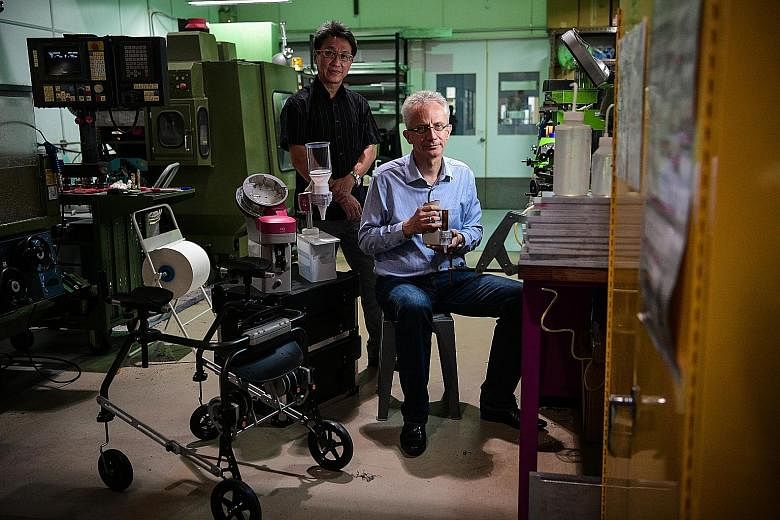Q What is XentiQ Partners about?
Mr Tan XentiQ first started in 1987 under the Singapore Institute of Standards and Industrial Research, which was carrying out industrial research as part of the Economic Development Board.
In 2008, Ulrich and I bought the company out.
Mr Schraudolph XentiQ is a design company which works with clients to develop products so all the IP goes to our clients. XentiQ Partners is a separate company set up in 2012 with the idea that we could create IP and our own products. We wanted to get involved in owning the products, not just developing products for somebody else. The contract development business of XentiQ is now a subsidiary of the Vicplas group while XentiQ Partners is independent and belongs to Eugene and myself.
Q What is one product XentiQ Partners has developed that you are most proud of?
Mr Tan We are very proud of all our products. While we do have a number of ongoing projects, there are some products that are already quite advanced.
Mr Schraudolph We are very excited about the Voyar walking trainer which we call the Frog.
The Frog is a walking trainer targeted at resolving issues in training for those with cerebral palsy, which is the leading disability among children. The condition affects an estimated 20 million children worldwide, and that number is growing.
The walking trainer, or walker, integrates a resting position - a seat allows the child to sit when he needs to. There is also a strong lifting force that will help the child stand when he wishes to transition easily and independently from sitting to walking.
One of the main issues that children with cerebral palsy face during training is fatigue. Our product fixes this problem by helping the children train at their own pace.
The Frog has a humanitarian aspect to it. It allows us to use technology for improvement, which is what is exciting about technology. For the Frog, we think it can have a profound impact as it helps children with cerebral palsy to walk better, changing the quality of their lives later on.
Q How does IP feature in the business, and how important is it?
Mr Tan When a firm files for IP, it stakes a claim which most companies will not infringe upon.
So if we want to get investors in, we need to prove that the products belong to us. We substantiate our claims with our patents and our IP. We possess patents for the spring mechanism in the Frog and our other products such as the professional tea-maker and some laboratory devices. We are also in the process of filing additional patents for our main products in the key markets of Singapore, the United States and Europe.
XentiQ Partners has only three staff, excluding us. I think the amount of investment we have put in, the tenacity of our efforts, and our strong regard for IP are quite unique for a firm of our size in Singapore. I do not think there are many similar SMEs. This is really derived from the mindset we have - we are very convinced of the need for protection and the need to enter international markets.
If a huge company copies our products, it might be difficult for us to pursue IP infringements because of the amount of resources that would have to go into that. However, other firms will infringe on our IP only if the market is big enough to attract them to do so. If it comes to that, it means we would have already made enough money to decide on what to do.
But for the niche markets that we are in, I don't think the returns are quite there for others to copy our products.
Q What is the biggest challenge for XentiQ Partners as an IP-focused company?
Mr Tan A challenge we face is that we do not really know how to sell our products. We need to translate some of the technology into products people want to buy. If we cannot sell or market our products, it is considered a failure. Our sales are low right now for XentiQ Partners. We need to address it and rope in the right partners to get to the next level.
Mr Schraudolph There are also challenges with filing patents. We had to learn along the way. It's a specific language to collaborate with the lawyers. It's always harder applying for the first patent than for subsequent ones. Firms will make mistakes along the way and be dependent on the lawyers. The drafting process is not easy and takes a lot of experience.
It's costly too, which is an obstacle. Patent costs are not subsidised here so it is quite onerous for SMEs. In Europe, there are schemes where SMEs get up to 50 per cent of their costs subsidised because governments want to encourage the filing of IP. Here, patent costs are considered as operational costs, which do not get subsidised.
Q What are XentiQ Partners' next steps for growth?
Mr Tan We will probably bring in a partner. If we have a sales organisation to work with we can leverage on their expertise to place our product. It will definitely be product specific so we expect to work with different partners in the future.
Mr Schraudolph We don't have any plans until we find the right partner and sales go up. We must be able to support growth. This is where we differ from most information and communications technology start-ups where firms need to scale to survive.
For niche products, firms do not need to scale until they are ready, although over time they can scale quite a bit. To me, that's quite satisfying because our product could still be here decades from now. Start-ups nowadays hope to exit in three to five years. XentiQ Partners speaks a different language

